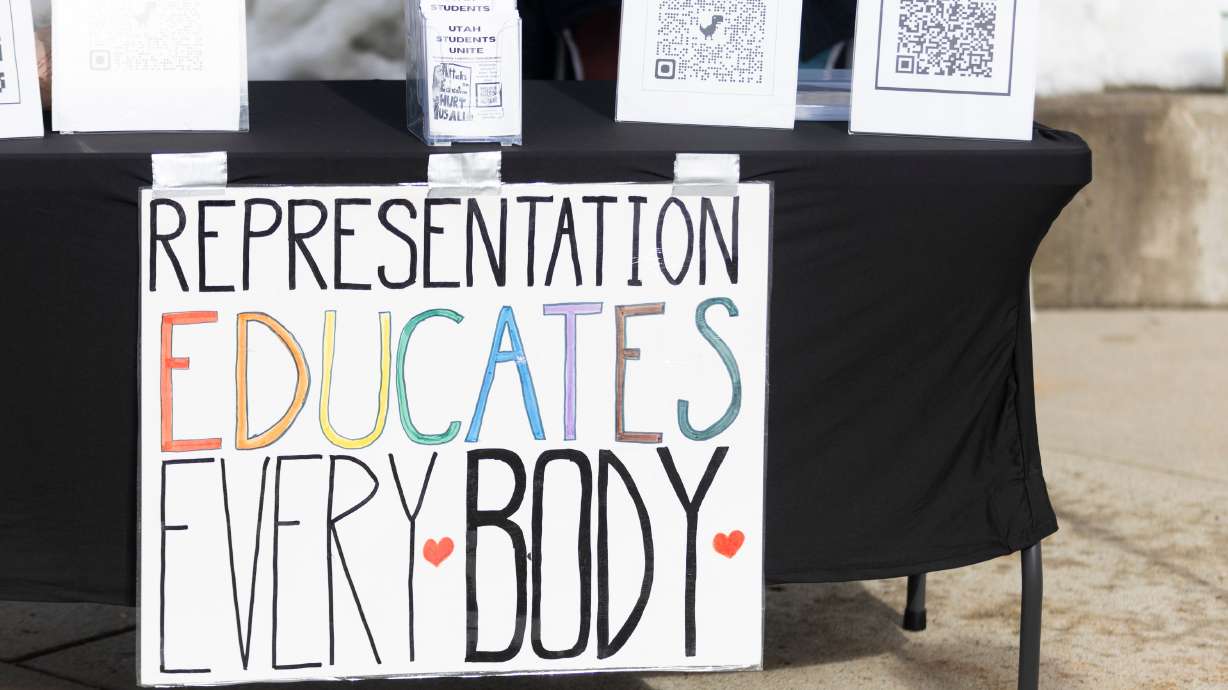Estimated read time: 4-5 minutes
This archived news story is available only for your personal, non-commercial use. Information in the story may be outdated or superseded by additional information. Reading or replaying the story in its archived form does not constitute a republication of the story.
SALT LAKE CITY — Debate over dismantling, revamping and otherwise reimagining the diversity, equity and inclusion offices at Utah's public universities per HB261 spurred intense debate as lawmakers debated the measure.
Now that Gov. Spencer Cox has signed it into law, it's up to officials at the state's universities to parse its provisions and figure out what sort of changes they'll have to make. At this stage, the precise upshot seems unclear, notwithstanding the affirmations of foes and backers of the measure as the HB261 debate unfolded.
"Yes, we have reviewed the bill and we're brainstorming how we'll continue to meet the needs of our students and community in light of it. We've been anticipating this legislation, so these are ongoing conversations, not new ones," said Bryan Magaña, spokesman for Weber State University. The measure has been in the works for a year and the new law takes effect July 1, giving impacted schools time to adjust.
Scott Trotter, spokesman for Utah Valley University, offered a similar message, as did representatives from the University of Utah and Utah State University.
"UVU's leaders are studying HB261 and collaborating with the Utah System of Higher Education to understand precisely what the bill requires and what modifications will be needed to comply with the new law," Trotter said. A representative from the Utah System of Higher Education, which oversees the state's public universities and has represented them in HB261 negotiations, didn't immediately respond to a query seeking comment.
Supporters, the Legislature's GOP majority, promoted HB261 as a means of expanding diversity, equity and inclusion programming to all students in need, including white students, not just the minority and other traditionally marginalized students such initiatives are designed to assist. HB261 foes, the Democratic minority, expressed concern the change would represent a step back in providing certain minority students the focused attention they say can help them thrive in a college setting and feel that they belong.
The critics' concerns notwithstanding, the officials from WSU, the U., USU and UVU said they aim to keep their campuses open, welcoming places for all students, regardless of the changes brought on by HB261. University officials kept largely quiet, at least publicly, as the debate unfolded.
"USU will remain committed to creating an inclusive campus, working within the guardrails of state law to ensure the university is a place where everyone has the opportunity to succeed," said spokeswoman Amanda DeRito.
As officials at the U. sort through HB261, the university "remains committed to fostering a campus community that welcomes everyone — across geography, ideology and identity," said spokeswoman Rebecca Walsh.
Magaña said WSU officials are hearing from skeptics worried the new bill will result in a scaling back of offerings for students of color and others traditionally served by diversity, equity and inclusion programs.
"Yes, we're hearing those concerns and questions, and those are things we'll carefully consider as we refine programs and services to serve our students and align with new legislation," he said. "But Weber State's commitment to access and promoting success for all students will not change."
Aside from revamping diversity, equity and inclusion offices — targeted by conservatives across the country — HB261 prohibits universities from asking job seekers for "diversity statements," meant to gauge an applicant's sentiments toward diversity, equity and inclusion efforts. The provisions apply not only to public universities, the focus of much of the debate, but to public K-12 schools and local and state governmental entities.
Another provision in HB261 prohibits programs, offices or initiatives that "are referred to or named diversity, equity and inclusion," wording that is now standard. The legislation alternatively refers to entities offering such programming in the revamped format as "student success and support" offices.
"We're still working through how the use of terminology around diversity, equity and inclusion will change on our campus, and there's more to the bill that requires additional research and input from stakeholders," Magaña said.
HB261 also aims to promote "academic freedom" on college campuses amid concerns of conservatives that their voices can be cut off.
While university officials are moving forward to implement changes called for in HB261, one critic said some are mulling legal action to keep the law from taking effect. Darlene McDonald of the 1 Utah Project and a former Democratic U.S. House hopeful told KSL.com that she and others are seeking legal advice to see if they have grounds to make a legal challenge. The 1 Utah Project aims to bolster civic engagement among people of color and "disaffected voters."
"We question the constitutionality of HB261 and plan on having conversations with key stakeholders to challenge this discriminatory classroom censorship law that severely restricts Utah's educators and students from engaging in scholarship about issues related to race and gender," McDonald said in a statement after Cox signed the bill into law on Tuesday. She had testified against HB261.









